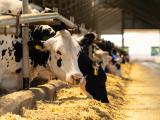Dec 20, 2001 (CIDRAP News) The US Department of Agriculture (USDA) will continue to test meat for Salmonella to confirm that meat processors' food safety systems are adequate, despite a court ruling that Salmonella tests can't be used to shut down a plant, Agriculture Secretary Ann M. Veneman announced this week.
In a statement issued Dec 18, Veneman said violations of Salmonella standards will trigger USDA inspections of meatpackers' safety systems. If a company does not fix safety problems that are found, USDA can still close the plant, she said. She also said USDA will review its food safety regulations to see if changes are necessary.
Veneman's statement came in response to the recent ruling by the Fifth US Circuit Court of Appeals in a suit brought by a Texas meatpacker. The court ruled that Salmonella in the packer's products was not a result of unsanitary conditions in the plant but was present in incoming meat. The Federal Meat Inspection Act can't be used to regulate the characteristics of meat arriving at the plant, the court said.
"This ruling does not impair our ability to close plants that do not meet the statutory and regulatory requirements of the law for processing meat and poultry," Veneman said. "We can and will shut down plants that do not meet that responsibility. We will increase our vigilance in meat plants to ensure compliance and the safety of our food supply."
Her announcement said that if a plant's products fail two sets of Salmonella tests, "USDA will immediately conduct an in-depth review of the plant's food safety systems and identify corrective actions to be taken. Failure by the plant to address any deficiencies will result in suspension or withdrawal of inspection, which would effectively shut down the plant." In the case that triggered the court ruling, USDA moved to suspend inspections of the plant on the basis of the Salmonella tests alone, without first examining the company's safety systems.
Veneman also said USDA will take several other actions to strengthen its food safety programs. The department will "conduct a comprehensive review of current food safety regulations and work with interested parties to determine if science-based changes are necessary to strengthen the Hazard Analysis and Critical Control Points (HACCP) system and other food safety programs." Under HACCP rules, plants must identify steps where contamination can occur and devise methods to prevent it. Possible changes in the HACCP system, Veneman said, might include additional pathogen-control steps for plants that produce trimmings. In the court case, the meatpacker said it bought beef trimmings that had higher levels of Salmonella than other cuts of meat.
USDA will also "expedite the placement" of 75 new consumer safety officers who will review plant HACCP plans and focus on plants that do not meet HACCP requirements, Veneman announced. This will bring the consumer safety officer staff to 110.
Further, USDA will review training procedures for plant inspectors and hold public meetings to gather advice on food safety programs, Veneman said. The department will also expedite a review of food safety research by the National Academy of Sciences (NAS) and the UDSA's Advisory Committeee on the Microbiological Criteria for Foods (ACMCF).
The American Meat Institute (AMI), a trade group, praised Veneman's promise to review food safety regulations and work with others to determine if changes in the HACCP requirements are necessary. In a report on its Web site, the group also said the NAS and ACMCF are studying the proper role of microbiological standards in ensuring meat and poultry safety. USDA should follow those groups' recommendations, which are expected shortly, AMI said.
See also:
USDA press release presenting Secretary Veneman's statement
http://www.usda.gov/documents/NewsReleases/2001/12/0267.doc
Related CIDRAP News story















